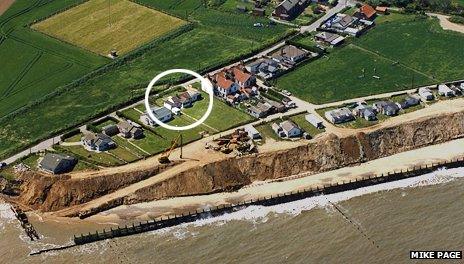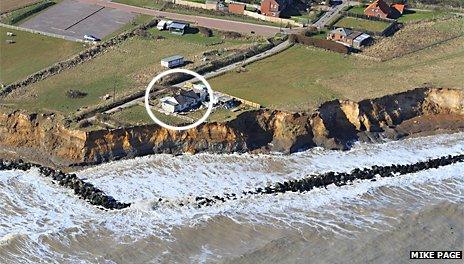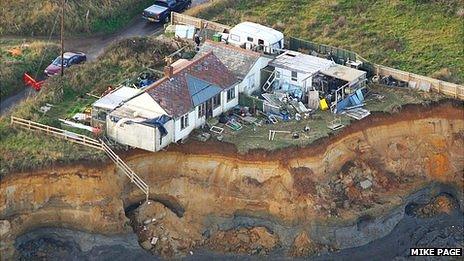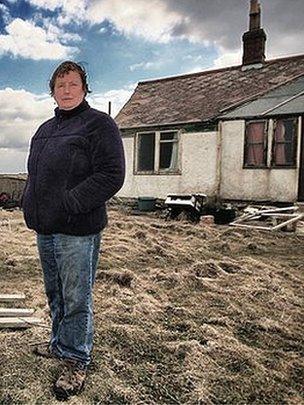'End of era' for Beach Road as surge claims last house
- Published

In 1998. Ms Neirop-Reading's bungalow was separated from the cliff face by a garden, road and neighbours

By Easter of this year, Mother Nature had left the property just metres from a sheer drop to the beach

The house finally succumbed to the power of the sea during the December tidal surge on the east coast
Seeing the corner of her beloved bungalow teetering over a cliff and her bathroom on the sand below, Bryony Nierop-Reading feels emotionally numb.
Last Easter, she hoped her home in Happisburgh, Norfolk, would still be hers for the next three years.
But the force of last Thursday's tidal surge took away the final 6ft of garden she had left and now she accepts that diggers will demolish what remains of her property.
"I knew it would come one day, but I suppose I'm just in shock. I'm not feeling a lot," said Ms Nierop-Reading, who is facing the prospect of spending Christmas in a caravan.
"Set against the horrors of what happened at Walcott and Hemsby, I can't complain. There is always someone who is worse off than you.
"But David the postman, who comes all the way down to me every morning, says it is an 'end of an era', and I guess it is."
For decades, Beach Road has drawn in tourists intrigued by the onset of the sea, but it has turned eerily quiet since the last of the homes and the tea room were bulldozed last year.
Wanting to keep her "million dollar view" for as long as possible, Ms Nierop-Reading rejected a compensation offer from the council to move, leaving her on her own.
But a few weeks before the surge struck, she said she had already started seeing "the writing on the wall".
"I chose to spend the night [of the surge] in the mobile in my field because I wasn't going to sleep in the house," she said.

Ms Nierop-Reading is preparing for her house to be demolished on Thursday
"The next morning the damage was pretty shocking. I didn't expect to see half of my house hanging over the cliff.
"I had written to the council saying I wanted the house demolished in two years time, but everything has just had to happen sooner."
Sea 'boiling over'
Having moved to the 1930s bungalow from a bit further inland just five years ago, there is no doubt Ms Nierop-Reading knew Thursday's demolition would happen at some point.
But she said by living there she hoped it would keep her in the "public eye", so people and governments would see the true cost of what is happening to livelihoods around the coast.
"If we don't talk about the need to stop erosion, this country will suffer so badly," she said.
"I don't know what I'll do next, but people have been coming round and helping me move my stuff out and it's been really heart-warming."
Malcolm Kirby, from Happisburgh's Coastal Concern Action Group, said: "I'd never seen anything like last week - it was like the whole sea was boiling over.
"I admire Bryony tremendously because I know she thought it would have been wrong to take the money, but in this surge so many people have been put in this position through no fault of their own.
"It has sent us some clear warnings. We can't just keep losing land to the sea and not doing anything about it."
- Published9 December 2013
- Published9 December 2013
- Published31 March 2013
- Published6 December 2013
- Published7 December 2013
- Published6 October 2012
- Published10 April 2012
- Published11 July 2011
- Published5 July 2011
- Published28 April 2011
- Published4 February 2011